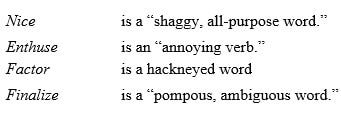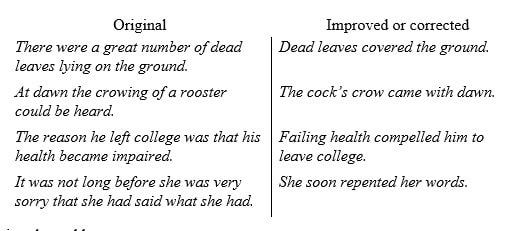Why Technical Writers Need Strunk & White’s “The Elements of Style”
August 17, 2021
Raise your hand if you have ever heard of Strunk and White’s “The Elements of Style.”
Now, raise your hand if you’ve ever used Strunk and White’s “The Elements of Style.”
Finally, if you raised your hand on the second question, raise it if you have used it lately.
Had the above commands been presented to me before I was given this blog topic, my hand would have remained firmly at my side. I have been a technical writer for more than 30 years. I’ve used “The Associated Press (AP) Stylebook,” the “Government Publishing Office (GPO) StyleManual,” and “The Chicago Manual of Style.” But Strunk and White (as I found it’s commonly called)???
I’m pleased to say that in completing this assignment, I discovered a gem. And, in case you’re not familiar with Strunk and White or have forgotten its worth, I will tell you what I found.
Who Is Strunk, Who Is White, and How Did this Book Come About?
More than a century ago, William Strunk was an English professor at Cornell University. In 1919, he wrote a 43-page style guide and published it solely for use at the university. He called it “The Elements of Style.”
One of Strunk’s students was E.B. White. In 1927, White became a daily contributor to The New Yorker magazine, and he later wrote the well-known children’s books “Stuart Little,” “Charlotte’s Web,” and “The Trumpet of the Swan.”

In 1957, thirty-eight years after having been Professor Strunk’s student, E.B. White rediscovered the little style. Strunk was deceased, but with the original publisher’s permission, White edited and expanded Strunk’s textbook.
The book has been revised three times (twice by White), and the fourth edition (2005) contains minimal changes, a new foreword by E.B. White’s stepson, and a glossary of grammatical terms. Since its publication in 1957, more than 10 million copies have been sold. To date, it has almost 7,000 reviewers on Amazon who have collectively given it a 4.6 out of 5. So perhaps those of us who have not heard of it are just late to the party, but let’s jump in.
Seven Helpful Aspects of the Book and How It is Written
1. It is 96 pages long.

Imagine having to read all 1,146 pages of the 17th edition of “The Chicago Manual of Style.” Just navigating the hardcover version is cumbersome!
The “AP Stylebook” is just over half as long, but it makes me yawn just to think about reading it cover to cover.
But “The Elements of Style” is short and easy to read. And it’s not boring—but more about that later.
2. The style is simple, repetitive, and clear.
First, it states the rule. Then, it gives examples of how the rule can be used to improve or correct a sentence or group of words. If there are notable exceptions to the rule, they are provided.
Rule 19, “Express coordinate ideas in similar form,” provides a sampling of the many examples that are provided throughout the book.
Rule 19 emphasizes that “. . . the writer should follow the principle of parallel construction.”

The next directive about parallel construction states:
Some words require a particular preposition in certain idiomatic uses. When such words are joined in a compound construction, all the appropriate prepositions must be included, unless they are the same.

Then:
Correlative expressions should be followed by the same grammatical construction. Many violations of this rule can be corrected by rearranging the sentence.

Perhaps you would have successfully corrected or improved each of the above, but the examples themselves show how one rule, “Express coordinate ideas in similar form,” has included several related rules and provided clear and compelling examples.
3. The explanations are succinct.
Here are but two of an entire book full of concise, easy to grasp explanations:
A dash is a mark of separation stronger than a comma, less formal than a colon, and more relaxed than parentheses.
Prefer the specific to the general, the definite to the vague, the concrete to the abstract.
4. You can take notes, underline, and easily find things again.
Both the book’s brevity and its organization are helpful in being able to use your highlighting or underlining to easily find things again. It’s especially handy to have it on an e-book reader where you can highlight passages and copy and paste sentences into a Note. Then, you can use the table of contents, your notes, and your highlighting to quickly find what you need.

5. It’s readable because it’s expository rather than encyclopedic.
The book “talks” to the reader. It’s not a mere listing; it’s a commentary. It’s as though your 9th grade English teacher is explaining something to you (only funnier—but we’ll get to that one, too).
Rule 3 in Chapter 1 states simply, “Enclose parenthetic expressions between commas.” Then the writer admits:
This rule is difficult to apply; it is frequently hard to decide whether a single word, such as “however,” or a brief phrase is or is not parenthetic. If the interruption to the flow is slight, the commas may be safely omitted. But whether the interruption is slight or considerable, never omit one comma and leave the other. There is no defense for such punctuation as
Marjorie’s husband, Colonel Nelson paid us a visit yesterday.
Imagine the words “there is no defense for” in the AP Stylebook. But that is one reason you can enjoy and remember the explanations.
6. The voice is emphatic.
There’s nothing wishy-washy about the language in this book. When the writer (whether Strunk or White) is disdainful of certain constructions, it is clear. When it’s important that you understand, the writer makes sure his point hits home. When something is poorly worded, there’s always an example of how it can be fixed, but there is also an explanation of why it’s poorly worded or what effect it has on the reader.
For example, the commentary about the word “certainly” in the chapter called “Words and Expressions Commonly Misused” minces no words:
Certainly. Used indiscriminately by some speakers, much as others use very, in an attempt to intensify any and every statement. A mannerism of this kind, bad in speech, is even worse in writing.
Is there any doubt about the writer’s opinion of “certainly”?
7. The content is simply and logically divided.
Chapter 1: Elementary Rules of Usage – 11 Rules.
Chapter 2: Elementary Principles of Composition – 11 Rules.
Chapter 3: A Few Matters of Form – 11 short sections, beginning with a single plural noun such as “Colloquialisms,” “Headings,” “Numerals,” “Parentheses,” and “References.”
Chapter 4: Words and Expressions Commonly Misused – 121 usage errors, including misused words, words that are not interchangeable but often confused, and word endings. Some of these may trip up even experienced writers. Each is explained in one paragraph, and, in some cases, it is accompanied by an example or two as well.
Chapter 5: An Approach to Style (With a list of Reminders) – 21 reminders to help the reader create narrative writing that is tight, clear, effective, and unpretentious.
My Reactions, Some Things I Learned, and Things That Are Good To Review
Eight of My Reactions
1. Humility – I knew there were things I had to look up from time to time (besides technical terms and whether to add trademarks, registration symbols, etc.), but I was confident I was close to knowing it all. Well, Strunk and White proved me wrong. I had more than one revelation that caused me to think, “Whoops! I’ve done that incorrectly.” And there were several times that I thought, “Have I been doing that correctly?” And there were even times that I thought, “I’ve never heard that one before.”
2. Satisfaction and Appreciation – Mixed in with the humbling content, there were things in which I took satisfaction in having known and adhered to. There were things that made me thankful to have had Ms. Blocker for 9th grade English. It was good to remember her diagramming sentences on the board, how emphatically she spoke, and how desperately she wanted her teaching to stick. I wish I could write her a note and tell her that it did.
3. Amazement – How can so much be packed so tightly? By page 45, I thought, “Is there anything about writing and grammar that’s not in here?

4. Realization (perhaps better communicated by “duh”) – I encountered things that I thought I had been doing intuitively. Strunk and White showed me that I was not so intuitive after all. “Oh,” I had to admit to myself, “there’s a rule and a reason for that. I just forgot and attributed it to my fine ear and logical mind.”
For example, Chapter 4, “Words and Expressions Commonly Misused,” addresses the use of these words:
Among. Between. When more than two things or persons are involved, “among” is usually called for: “The money was divided among the four players.” When, however, more than two are involved but each is considered individually, “between” is preferred: “an agreement between the six heirs.”
Had I been asked to fill the correct preposition in the preceding examples, I would have answered correctly. But I had forgotten or not understood the distinction to be “but each is considered individually.”
5. Surprise and Recognition – “Wow! How long has it been since I thought about that? Makes sense, though.” Here is one of the instances that took me back. Doubtless you will find others.
Rule 15, “Put statements in positive form,” provides three examples of improving a sentence by removing “not” and rewording the sentence. The writer than explains:
All three examples show the weakness inherent in “the word not. Consciously or unconsciously, the reader is dissatisfied with being told only what is not; the reader wishes to be told what is.
My reaction was, “How long has it been since I spent time thinking about the word ‘not’?” I must admit, however, it makes perfect sense.
6. Wondering About Overthinking – This made me realize that some things I’ve been overthinking or spending too much time to improve are fine the way they are. What a relief!
The idea of the word “none” being followed by a singular verb has been indelibly etched in my brain. In Rule 9, “The number of the subject determines the number of the verb,” I sailed right through using a singular verb after each, either, everyone, everybody, neither, nobody, and someone. I continued to congratulate myself in knowing:

But then I encountered this:
A plural verb is commonly used when “none” suggests more than one thing or person.
“None are so fallible as those who are sure they’re right,”

Would I have worked at that sentence worrying that I should change the whole sentence so that it could rightly use “None is”? Would I have shrugged and said, “Well, it kind of sounds right . . .” Would I have overthought something that was already correct? Now, thanks to the writer having offered it as the exception, I don’t have to worry about it.
7- Enthusiasm – Sometimes Strunk and White simply elicits a “Yes! I wish other people could be convinced of that!” By the way, Strunk and White warns against overuse of the exclamation point, but I really am excited when I write that, and you’ll see why in a minute. Here’s what Strunk and White says:
Do not attempt to emphasize simple statements by using a mark of exclamation. The explanation mark is to be reserved for use after true exclamations or commands.
As it turns out, my sentences match the examples that are provided.
Every day, I read or hear a journalist misuse the English language. Yesterday, I read an article about a wedding. The bride died shortly before the wedding, and the families decided that the groom should marry the sister of the bride. The article began with:
“In a series of unfortunate events, a groom married the sister of his bride after she collapsed and died earlier in the wedding ceremony.”
Rule 20 of Chapter 2, “Elementary Principles of Composition,” says:
The position of the words in a sentence is the principal means of showing their relationship. Confusion and ambiguity result when words are badly placed. The writer must, therefore, bring together the words and groups of words that are related in thought and keep apart those that are not so related.
Then it provides four rules for avoiding ambiguity. Each rule is followed by an explanation and examples of awkward construction and how to improve them.
Yesterday, I also came across an article that said an endeavor “failed bigly.”
Here’s what Strunk and White has to say:
Do not construct awkward adverbs. Adverbs are easy to build. Take an adjective or a participle, add -ly, and behold! You have an adverb. But you’d probably be better off without it. … Words that are not used orally are seldom the ones to put on paper. Do not dress up words by adding -ly to them, as though putting a hat on a horse.”
And how many times have you heard, “Sadly, he passed away” or “Hopefully, the victim will survive.”
Here what Strunk and White says about “hopefully:”
This once-useful adverb meaning “with hope” has been distorted and is widely used to mean “I hope” or “it is to be hoped.” Such use is not merely wrong, it is silly. To say, “Hopefully I’ll leave on the noon plane” is to talk nonsense. Do you mean you’ll leave on the noon plane in a hopeful frame of mind? Or do you mean you hope you’ll leave on the noon plane? Whichever you mean, you haven’t said it clearly.
Now you see why I delight in saying “Yes!” and why I wish others were convinced of these blunders.
8- Pure Enjoyment – This book is short, engaging, emphatic, and sometimes an example is such a perfect distillation of the subject that you may stop, back up, and read it again. But there also some passages of unadulterated disdain that made me chuckle:
The foreseeable future. A cliché, and a fuzzy one. How much of the future is foreseeable? Ten minutes? Ten years? Any of it? By whom is it foreseeable? Seers? Experts? Everybody?

In Chapter 4, “Words and Expressions Commonly Misused,” there is a discussion of the word “people” that includes this warning:
The word “people” is best not used with words of number in place of “persons.” If, of six people, five went away, how many people would be left? Answer: one people.
Things That I Learned
Perhaps the sentences in this section will provide examples of little-known rules. Perhaps they will only serve to reveal the blog writer’s ignorance. But I am given some indication that I am not alone when I highlight a passage and my e-reader lets me know that 680 other people have highlighted the passage:
It is permissible to make an emphatic word or expression serve the purpose of a sentence and to punctuate it accordingly.
Again and again he called. No reply.
The preceding example is not one that a technical writer is likely to incorporate, but it was interesting. I knew it was employed in literature, but I didn’t know it was “correct.”
Rule 10, “Use the Proper Case of Pronoun,” contained this short gem:
Do you mind me asking a question?
Do you mind my asking a question?
In the first sentence, the queried objection is to me, as opposed to other members of the group, asking a question. In the second example, the issue is whether a question may be asked at all.
Again, I would have correctly identified the correct usage, but the example provided new insight.
I learned something from the paragraph below, as I thought “to” always followed compare in instances like these:
Compare. To compare to is to point out or imply resemblances between objects regarded as essentially of a different order; to compare with is mainly to point out differences between objects regarded as essentially of the same order. Thus, life has been compared to a pilgrimage, to a drama, to a battle; Congress may be compared with the British Parliament. Paris has been compared to ancient Athens; it may be compared with modern London.
Here are two more I’ve misused:
Enormity. Use only in the sense of “monstrous wickedness.” Misleading, if not wrong, when used to express bigness.
Claim. (verb). With object-noun, means “lay claim to.” May be used with a dependent clause if this sense is clearly intended: “She claimed that she was the sole heir.” (But even here claimed to be would be better.) Not to be used as a substitute for declare, maintain, or charge.

Things That are Good to Review
Here are some things the book offers that are worth your review.
1. Never forget structure.
Rule 12 in Chapter 2 is “Choose a suitable design and hold to it.”
A basic structural design underlies every kind of writing. Writers will in part follow this design, in part deviate from it, according to their skills, their needs, and the unexpected events that accompany the act of composition. Writing, to be effective, must follow closely the thoughts of the writer, but not necessarily in the order in which those thoughts occur. This calls for a scheme of procedure.
2. Don’t get sloppy. Keep your editing fierce.
Vigorous writing is concise. A sentence should contain no unnecessary words, a paragraph no unnecessary sentences, for the same reason that a drawing should have no unnecessary lines and a machine no unnecessary parts. This requires not that the writer make all sentences short or avoid all detail and treat subjects only in outline.”
3. Appreciate brevity and review the techniques to achieve it.
The habitual use of the active voice, however, makes for forcible writing. Many a tame sentence of description or exposition can be made lively and emphatic by substituting a transitive in the active voice for some such perfunctory expression as “there is” or “could be heard.”

The writer then adds:
Note, in the examples above, that when a sentence is made stronger, it usually becomes shorter. Thus, brevity is a by-product of vigor.
Conclusion

Simone Biles, 24, has won a combined total of 32 Olympic and World Championship medals, making her America’s most decorated gymnast. Biles began gymnastics training when she was six years old. With 20 years of training and 32 medals, why does she need a coach?
The answer is simple. She needs critique and encouragement. Just as critique and encouragement keep Biles at peak performance, it can keep an experienced writer from lapsing into complacency.
Reading Strunk and White’s “The Elements of Style” combats complacency and replaces it with humility and determination. Using it for reference can provide constant encouragement. Precision can be mastered!
You may now feel like you have read dozens of reviews on a bookseller’s website. However, I hope you learned something more than the reviewer’s opinion of the book. I hope you learned something from the book itself.
And I hope you got a flavor of why it is a valuable companion reference for meticulous writers who, like those employed by The Writers For Hire, insist on precision in pursuing their craft.































